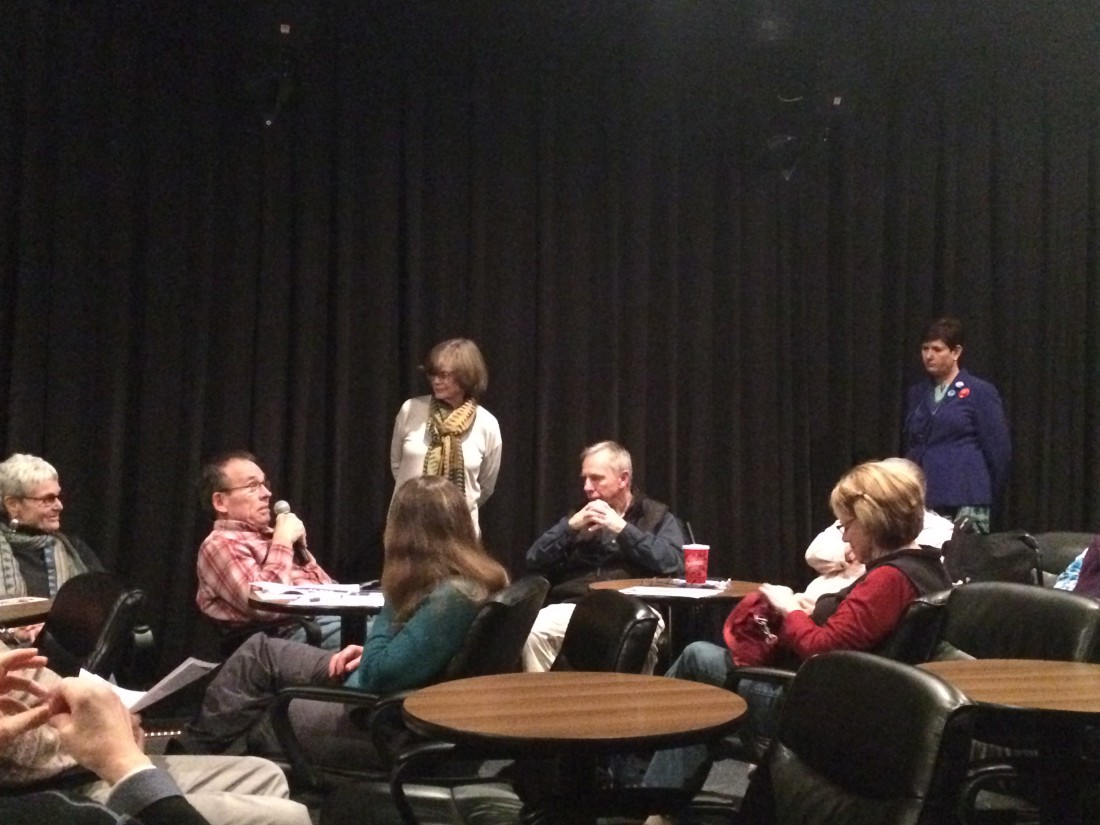Dr. Marsha Fretwell addressed a crowd of 25 in blunt terms Monday in Flat Rock: “We need to get for-profit health insurance out of the marketplace.”
Fretwell, a former geriatric physician and a member of Healthcare for All Western North Carolina, crystallized the thesis of the documentary Fix It: Health Care at the Tipping Point, which had finished a double feature at Flat Rock Cinema. The film, sponsored by the Henderson County chapter of Our Revolution, the progressive political organization spun off from Bernie Sanders’ presidential campaign, made a businesscentric case for single-payer health care.
With dark musical undertones thrumming, the documentary opened with the story of Richard Master, the increasingly distressed owner of a framing business. He described watching his employees’ premiums double over 10 years, even as his margins thinned, and worried what that price tag meant for the business.
Master was not alone. The documentary bounced among academics, economists and business executives who trotted out a series of grim and disturbing statistics about the cost and effectiveness of health care in the United States. More than 60 percent of bankruptcies in the United States are connected to medical bills, the documentary warned, before showcasing a man whose hemophilia medications cost him $50,000 a month. At that number, the audience let out an audible gasp.
The numbers piled up: In 1971, health care in the United States accounted for 7 percent of the country’s total economic activity; now, it accounts for 18 percent. (In other industrialized countries, that number hovers around 10 percent.) The increase, we learn, corresponds with the rise of for-profit health insurance companies’ control of the marketplace. Those health insurance companies, said Michael Lighty, director of public policy for National Nurses United, act like “an invisible force in the room,” directing health care decisions for patients instead of health care professionals doing so, inevitably worsening care.
When the documentary mentioned single-payer health care, its score turned buoyant, and the onscreen scenery took on a decidedly brighter tone — grass began to grow around sick cartoon stick figures. Canadian practitioners raved about their experience with single-payer in stark contrast to their harrowed American counterparts. In perhaps the most striking interview of the documentary, Wendell Potter, a former CIGNA executive, told the audience, “I regret what I did. … I misled people.” Now, he works toward universal health care.
A Republican lawmaker, Dave Steil of Pennsylvania, urged the business-minded toward single-payer, noting that it would save money for both the country and for businesses — who would not have to pay expensive premiums for employees. The single-payer supporters were ahead by a landslide when the lights came up, so when Fretwell asked,“How many people are already convinced that we need health care reform?” every hand in the room shot up.
But Dr. Becky Love, a family physician based in Shelby, had concerns. She wondered what a transition to a national single-payer system might look like since powerful industry interests will surely oppose such a move. “Bernie says: ‘Drop Medicare to people 50 and over,’” Fretwell responded. “And, actually, if I were queen, that’s what I would do too.”
Love, though, invoked monthslong delays in payment by Medicare, which gave her pause. Her proposal for a transition involved putting a single-payer option on the Affordable Care Act’s insurance marketplace, offering a cheaper option for primary care. If it worked for a subset of the population, she suggested, it could be expanded accordingly.
Fretwell stressed that health care is not a political issue but a health and moral issue. “We need to get together on this as a country,” audience member Jim Kane said to Xpress. “If North and South Korea can go to the Olympics together …”
Still, the politicians in attendance were Democrats. Amy Donaldson, wife of Hendersonville urologist Scott Donaldson, who is running for Mark Meadows’s 11th District House of Representatives seat, told a story about a relative getting a year of treatment for lymphoma in Korea for the same amount that each of his annual follow-ups now costs in the United States (and stumped for her husband a bit in the aftermath). Sam Edney, a hopeful for the state House of Representatives in North Carolina’s 113th District, showed up as well. His main health care focus, he said, was expanding Medicaid, which he described as urgent thanks to rampant middle-income job loss in his district.
“We’re sending, this year, $3 billion to states that did expand Medicaid,” Edney told Xpress. “Arizona, Kentucky, Ohio: John McCain, Mitch McConnell, John Kasich. So why did we get all the dumb Republicans? We’re doing the exact opposite of what we should be doing, because of the ideologues in Raleigh.”
But Kyra Moore of Hendersonville, who organized the event, has a plan to reach across the aisle. “We’re going to take this into all the churches around here,” she said, her ubiquitous dog, Dusty, hanging placidly at her ankles. “Then we’re going to take this film into the conservative areas. And we’re the type of people that when we say we’re going to do something, we’re going to do it.”




What a great educational occasion in Flat Rock last Monday! It is not a coincidence that Healthcare for All WNC is sponsoring an informative forum on
Healthcare for All: Good for Busine$$ on Tuesday Feb. 27 at 7:00 – 8:30 PM in A-B Tech Ferguson Auditorium 340 Victoria Road, Asheville.
Admission is free. Three Business leaders speak on benefits of universal healthcare: David J. Steil — CEO MicroTrap Corporation, former Republican PA state legislator, Gus Vickery,MD — Owner Vickery Family Medicine, and Vijay Kapoor — Member Asheville City Council, Owner The Kapoor Co. And Dr. Carol Paris, President of Physicians for a National Health Program, will make brief remarks. — A question-and-answer session will follow the presentations —